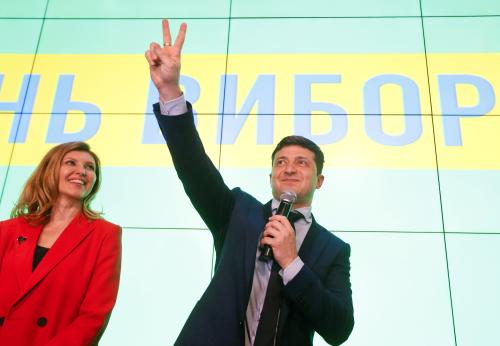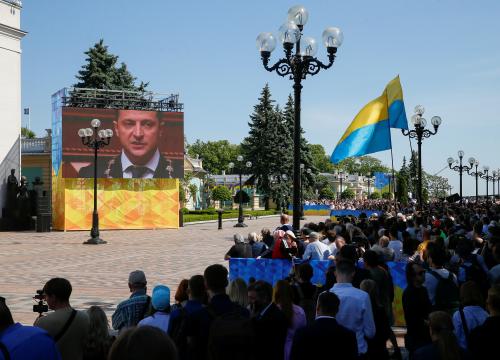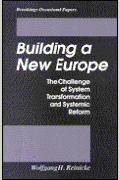Ukraine’s President Volodymyr Zelensky reconfirmed his political dominance in parliamentary elections last Sunday, obtaining an absolute majority in the Rada, or parliament, of 254 seats out of 424. This victory allows him, for the first time in Ukrainian history, to create a single-party government. However, his victory will neither guarantee the country’s political transformation nor make efforts to navigate the tense political situation straightforward. Indeed, the outcome begs four questions.
Question 1: Are you looking for absolute power?
Creating a single-party government was one of Zelensky’s electoral campaign goals, with his supporters arguing they did not want to compromise and limit the ability of a new government to implement reforms. On the one hand, such a position is understandable, as a single-party government may be more stable and obviates the need to spend time searching for agreement and compromising on tough issues.
On the other hand, a single-party government will fall under the absolute control of the president and his administration, thus weakening or negating the checks and balances enshrined in the Ukrainian constitution. A recent example of how this could play out in Ukraine relates to an effort to impose environmental regulations on the Arcelor Mittal metallurgical plant in Zelensky’s hometown. Soon after Zelensky questioned the merits of the regulations, the Security Service of Ukraine (SBU) raided the company’s office, though the SBU’s responsibility should be limited to organized crime and national security issues, not environmental protection.
A key lesson from Eastern Europe’s transformation was that single party dominance often leads to the usurpation of power, with personal motives crowding out values and principles.
The question of whether Zelensky is ready to create a coalition that would compel him to limit his power and freedom and grant his partner(s) considerable clout is of great importance to the country’s governance. This is especially true considering how unclear the new president’s future path appears to be.
Question 2: Is there a Zelensky plan?
In his presidential campaign this past Spring, Zelensky focused on criticizing his opponents rather than on announcing his plans and ideas. The president’s team has not yet disclosed any such plans, despite having promised to do so by the time of the presidential inauguration. Instead, Zelensky’s actions and decisions seem to be driven by emotional rather than rational motivations.
While the new government’s social and economic policies may be articulated by September, Zelensky must also articulate a strategy for fighting corruption.
Though comprehensive judicial reforms were designed under former President Poroshenko, implementation failed. The reform assumed that the judges would go through an anti-corruption and professional verification process, while efforts were made to change the composition of the Supreme Court by bringing in judges with unblemished reputations. Yet most entrenched judges retained their positions, and the legal system was further compromised when the Poroshenko administration began pressuring judges, dictating to them how to rule on specific cases.
Zelensky and his team recognize these governance problems and have publicly stated their concern, establishing a special task force to comprehensively evaluate the results of the judicial reform and to improve the efficiency of the judiciary. But the ways and means of a new reform, as well its timing, are unknown.
Ukraine is one of the most corrupt countries in Europe, ranking 120th (out of 180) in Transparency International’s Corruption Perception Index last year. While President Poroshenko created a new legal infrastructure with governance reforms in mind, the fight against this state-destroying phenomenon was, for all intents and purposes, never launched. On the one hand, Poroshenko delayed the creation of a specialized Anti-Corruption Court, which will only start in early September. On the other, the former president and the prosecutors general loyal to him blocked or closed down many investigations involving people close to him and the government.
Question 3: Who is your team?
A vital first step toward devising a comprehensive anti-corruption campaign will be to appoint a new prosecutor general. This selection should happen after the start of the new Rada’s work. However, who will occupy this chair, as well as who will stand at the head of the anti-corruption prosecutor’s office, remains a secret. President Zelensky, having twice proposed dismissing the current prosecutor general, has not yet signaled who the potential successor might be. The success of the entire anti-corruption campaign depends on the values and principles of this person, as well as on his or her ability to act independently.
The president also remains enigmatic regarding the composition of the new government. Long before the election, it was evident that his party would get at least 40 percent of the seats in the Rada, but the presidential team refused to discuss the concrete steps that would be taken to appoint ministers. Zelensky’s successive statements and actions—the introduction of a bill on the massive but ill-defined “house cleaning” or lustration of entrenched politicians, officials, and judges from the President Poroshenko era, and the rise to power of a person who “has never been in politics”—further clouded the problem.
The preponderance of Zelensky appointees who do not have experience in public service is an inevitable price for the rapid handover to a new political generation and must be treated with understanding. But this does not eliminate Zelensky’s personal responsibility to build an efficient team.
Question 4: Is a real transformation likely?
Last Sunday’s electoral outcome was proof that Ukrainians are looking for a faster and more productive national transformation. Voters resoundingly ousted politicians who played leading roles over the past 20 years. The president’s party, The Servant of People, and Slava Vakarchuk’s Voice party obtained two-thirds of the seats in the Rada. (Vararchuk is the most popular rock singer in Ukraine and has virtually no political experience.) Both Servant of the People and Voice have pro-reform, pro-Western platforms.
President Zelensky has to answer whether or not this will result in a real, long-awaited transformation of the country.
The Brookings Institution is committed to quality, independence, and impact.
We are supported by a diverse array of funders. In line with our values and policies, each Brookings publication represents the sole views of its author(s).








Commentary
Parliamentary elections in Ukraine and 4 questions for President Zelensky
July 24, 2019